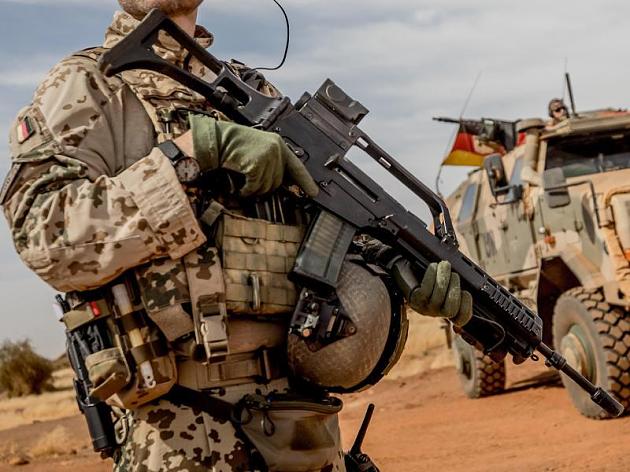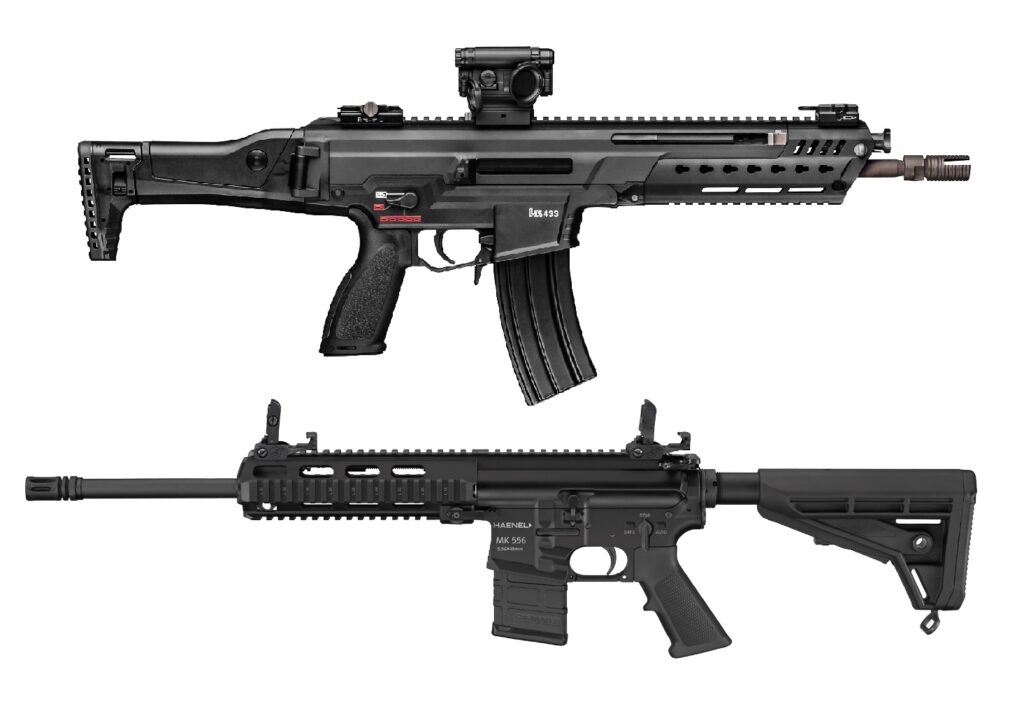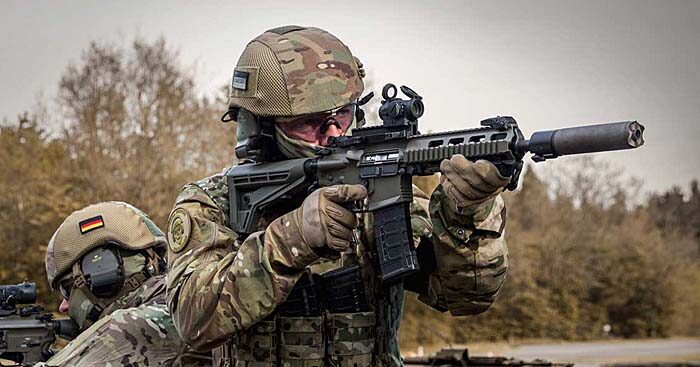By Konstantinos Likas,
Berlin. The Bundeswehr, i.e. the German Armed Forces, and the Federal Ministry of Defence (Bundesministerium für Verteidigung, abbreviated as BMVg) have reached a decision, on September 14th 2020, on the case of the two competing companies in replacing the G36 rifle in general service with the military. A rifle, that has been bedeviled by reports of malfunctions when fired fully automatically and that is heavier than more modern, AR-platform rifles (such as the HK416), was slated for replacement and 3 candidates were proposed. One was withdrawn, two were left. Then, one of the two was selected just recently, so the saga should have been terminated.
Alas, nothing could be further from the truth. The losing company, Heckler and Koch GmbH, was evidently shocked by the decision. The CEO, Jens Bodo Koch, was clear about his dissatisfaction and his intentions: “Notwithstanding a thorough legal examination we are saddened by this decision”. Heckler und Koch are already examining all legal means available to them – they are permitted to appeal the decision within 2 weeks of the decision, effective September 14th. And they can only do so, for good reason. In 2018, the company recorded losses; it’s only recently, in 2019, that they have managed to return to profitability and restructure their debts and bonds payable in 2022 and 2023. The loss of a contract worth 250 million euros will not be conducive to their financial efforts, even though they have substantial contracts with foreign militaries – especially the French Armed Forces – to help buoy the company and prevent any job cuts off their 950 employees, a fact not lost on the CEO himself.
Au contraire, the winner company, C.G. Haenel GmbH, is a small enterprise that manufactures sniper rifles for the German special forces, but also hunting rifles and rifles for civilian use. They do not have the industrial capacity to manufacture 120,000 rifles for military use; they have only had 9 workers in 2018, according to der Spiegel, so they would need serious financing to grow in order to fulfill these requirements. And their investors create concerns; the company belongs to the Merkel Jagd- und Sportwaffen GmbH (who financially supported Haenel GmbH in 2018), which itself is owned by UAE nationals, who are its investors. No wonder that der Spiegel reported on this story on an article titled “the Arabian assault rifle” (“Das arabische Sturmgewehr”). So how could such a decision further complicate this process?

The current service rifle of the German Armed Forces is the G36 rifle. It is the successor of the G3 rifle, entering standard service in 1997 and serving as the main rifle of choice for many militaries (notably the German and Spanish militaries), many more special operations units, and police units all over the world. However, the rifle was beleaguered by technical problems and scandals; in 2014, Bundeswehr combat units in Afghanistan reported overheating and accuracy problems with the rifle. Technical tests were done by the BMVg and several other agencies to identify the problem. Initially, the ammunition was blamed for that issue, but then a structural problem with the G36’s unsupported free-floating barrel was identified. Wikipedia’s G36 article, citing the Welt, reports that, according to the Fraunhofer Ernst Mach Institut (EMI) and Wehrtechnische Dienststelle 91 (WTD91), the accuracy levels of the G36 decline to 7% at 100 meters when the temperature increases by 30 °C or more.
Hence the decision of Ursula von der Leyen, the then Defence Minister (before she made President of the European Commisison), to affirm that “the G36 in its current form has no future in the Bundeswehr”. And so began a competition to replace the much beleaguered rifle.
Four rifles were proposed, out of which 2 were from HK; the HK 416A7 and the HK 433. From the very beginning, the HK416A7 was rejected from general service. It was selected for service with the German special forces (KSK, KSM, EGB and other units) due to the fact that despite being the best AR platform today, it is prohibitively expensive for general service. Purchasing several thousand rifles for elite units is one thing. Purchasing 120,000 rifles that are extremely expensive, for use by everyone, from line infantry units to logisticians, was simply anti-economical – or it was simply not so much of a priority, especially given the fact that COVID-19 has plunged the world into a recession and created a multi-billion hole into German government finances.
So they were left with three rifles; The HK 433, HK’s second candidate, which was developed specifically for the competition and was a more compact variant of the HK 416 as well as a radically different one; Haenel Industries’ MK556; and SIG Sauer’s MR555. Of the three, SIG Sauer withdrew its candidate due to allegations of “unfair treatment”. Hence, two were left, out of which the MK556 was selected even though the HK 433 was a favourite because it’s a Heckler and Koch rifle.
And therein lies the core of the controversy. As a matter of fact, Haenel itself is the source of the debate. The der Spiegel had quite an extensive report on this issue; C.G. Haenel GmbH has been manufacturing weapons since 1840 in Suhl, Thuringia. It is known for manufacturing the first assault rifle in history, the Sturmgewehr 44 (StG44). However, the company collapsed in 1945 and was only recently resuscitated in 2008. The Spiegel reported that, in 2018, only 9 workers were working at C.G. Haenel GmbH. Hence, the issue has arisen of whether the standard-issue service rifle of the German military will actually be delivered in the first place. Grandfathering clauses do exist in the contract, so Haenel would not survive the full fury of a German Federal Government lawsuit, but the German military, in extremis, would not get the new weapons. In addition, the shareholders of the Merkel Group, to which the company belongs, is a United Arab Emirates company, the EDGE Group. This exacerbates the controversy.

But then we have to grasp the more pertinent question on why was Haenel’s rifle selected over that of HK. Or rather, why was HK’s rifle rejected, in spite of the fact that HK has been supplying the Bundeswehr, and many foreign militaries and police forces, especially European ones, with weapons since 1956, in the first place. Details are unavailable and defence procurement contracts are always opaque; OPSEC, after all, is not insignificant. The BMVg obviously knew that Haenel is a tiny company, owned by UAE investors, and that its production capacity is inferior to those of HK’s. But that is a matter that is being discussed within German political institutions. The problem lies, in actuality, with Heckler und Koch GmbH itself.
As mentioned above, Heckler und Koch and the Bundeswehr have had a difficult relationship recently. The aforementioned G36 debacle is the cause of this entire replacement process in the first place. Hence a lack of trust in HK itself may be indicated. The BMVg has some bad blood with HK and the German arms industry is being bedeviled and attacked by German politicians of the leftist parties, mainly die Linke, but also the Greens and the leftist fractions of the SPD. The company’s past scandals do not help the entire process, either. Hence, the decision to reject the HK 433 over the MK 556 – even though the BMVg has rejected this notion, saying that this process was meritocratic – can also be attributed to HK’s problems. Haenel offered, according to the BMVg, “better service” and cheaper costs, even though both the HK 433 and MK 556 fulfilled the requirements of the Bundeswehr. Not that the MK 556 is substandard, but whether it is a cheaper but effective version of the HK416 or merely an “HK416 from Lidl”, remains to be seen. What is certain, is that HK will not let this go unresolved.
To sum up, the German military has been looking for a replacement of the G36 rifle for a long time and, even though a replacement has been identified, the selection process is as controversial as it is opaque. The Bundeswehr may has selected a rifle to replace the G36 after a long time, however, given the concerns regarding Haenel’s true capabilities to deliver and the fact that HK is perusing all legal means to dispute the decision – notwithstanding the authority of the Bundestag to override or approve the decision – the replacement will take time. The issue is controversial, and some questions remain unanswered. After all, the decision will become permanent only at the end of the year.




